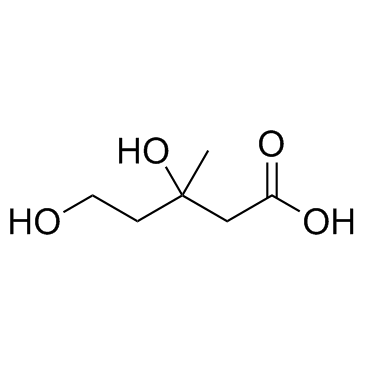Mevalonic acid |
| Catalog No.GC30324 |
L'acide mévalonique (MVA) est une substance précurseur de la voie du mévalonate, essentielle À la croissance et À la prolifération cellulaire.
Products are for research use only. Not for human use. We do not sell to patients.

Cas No.: 150-97-0
Sample solution is provided at 25 µL, 10mM.
Mevalonic acid is a precursor of cholesterol in the de novo biosynthetic pathway[1]. it is an important intermediate product of cholesterol and terpenoid synthesis, and plays an important role in regulating cell proliferation and collagen synthesis. Mevalonic acid stimulates HMGR expression and plays a key role in regulating cell growth[4].
C2C12 myotubes were incubated with simvastatin for 72 h in the absence or presence of increasing amounts of mevalonic acid. Following incubation, cell viability was measured . Control incubations with DMSO or mevalonic acid, but no simvastatin, had no effect on cell viability. C2C12 myotubes incubated with simvastatin manifested the expected decline in cell viability while myotubes incubated with simvastatin plus mevalonic acid showed no decline in cell viability at all mevalonic acid concentrations tested. Thus, it is concluded that mevalonic acid prevents manifestation of the deleterious effects of high-dose simvastatin treatment on C2C12 myotubes[2]. Mevalonic acid promotes tumor growth and, therefore, an increase in mevalonate synthesis in extrahepatic tissues following cholesterol-lowering therapy may explain the increased risk of cancer observed in some studies[5,6].Inhibition of the Mevalonic acid metabolic pathway in tumor cells elicits type 1 classical dendritic cells (cDC1) mediated tumor recognition and antigen cross-presentation for antitumor immunity. It demonstrates tumor Mevalonic acid metabolic blockade stimulates a cDC1 response through CLEC9A-mediated immune recognition of tumor cell cytoskeleton[3]. Mevalonic acid have become a focus area in research on the development of antitumor drugs [7].
In the mouse experiment, Xuezhikang inhibited the Fas/FasL apoptosis pathway of myocardial cells in rats with ischemia/reperfusion, and then inhibited the apoptosis of cardiomyocytes, Mevalonic acid can attenuate the protective effect of Xuezhikang[8].
References:
[1]: Naoumova RP, Marais AD, et,al. Plasma mevalonic acid, an index of cholesterol synthesis in vivo, and responsiveness to HMG-CoA reductase inhibitors in familial hypercholesterolaemia. Atherosclerosis. 1996 Jan 26;119(2):203-13. doi: 10.1016/0021-9150(95)05649-1. PMID: 8808497.
[2]: Moschetti A, Dagda RK, et,al. Coenzyme Q nanodisks counteract the effect of statins on C2C12 myotubes. Nanomedicine. 2021 Oct;37:102439. doi: 10.1016/j.nano.2021.102439. Epub 2021 Jul 10. PMID: 34256063; PMCID: PMC8464493.
[3]: Xu F, Wang Z, et,al. Mevalonate Blockade in Cancer Cells Triggers CLEC9A+ Dendritic Cell-Mediated Antitumor Immunity. Cancer Res. 2021 Sep 1;81(17):4514-4528. doi: 10.1158/0008-5472.CAN-20-3977. Epub 2021 Jul 15. PMID: 34266895.
[4]: Scoppola A, De Paolis P, et,al. Plasma mevalonate concentrations in uremic patients. Kidney Int. 1997 Mar;51(3):908-12. doi: 10.1038/ki.1997.128. PMID: 9067929.
[5]: Melhem MF, Gabriel HF, et,al. Cholestyramine promotes 7,12-dimethylbenzanthracene induced mammary cancer in Wistar rats. Br J Cancer. 1987 Jul;56(1):45-8. doi: 10.1038/bjc.1987.150. PMID: 3113472; PMCID: PMC2001672.
[6]: Rao KN, Melhem MF, et,al. Lipid composition and de novo cholesterogenesis in normal and neoplastic rat mammary tissues. J Natl Cancer Inst. 1988 Oct 5;80(15):1248-53. doi: 10.1093/jnci/80.15.1248. PMID: 3418731.
[7]: Duncan RE, El-Sohemy A, et,al. Mevalonate promotes the growth of tumors derived from human cancer cells in vivo and stimulates proliferation in vitro with enhanced cyclin-dependent kinase-2 activity. J Biol Chem. 2004 Aug 6;279(32):33079-84. doi: 10.1074/jbc.M400732200. Epub 2004 May 20. PMID: 15155733.
[8]: ZUO Hanheng, LI Yinping et,al. Effects of Xuezhikang on Cardiomyocyte Apoptosis.
Average Rating: 5 (Based on Reviews and 18 reference(s) in Google Scholar.)
GLPBIO products are for RESEARCH USE ONLY. Please make sure your review or question is research based.
Required fields are marked with *




















